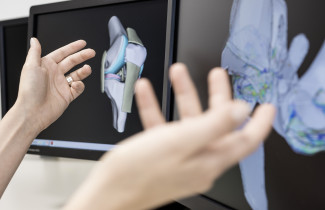An international team of scientists led by Dr. Jayachandran Kizhakkedathu (University of British Columbia, Canada), Dr. Mark Grinstaff (Boston University, United States), and Dr. Janne T. A. Mäkelä (University of Eastern Finland, Finland) published the first report of synthetic globular polymers of several million molecular weight. These spherical single polymers are similar in size to proteins and are up to 50 nm in diameter.
The study in Nature Communications, entitled Mega macromolecules as single molecule lubricants for hard and soft surfaces (https://doi.org/10.1038/s41467-020-15975-6) summarizes the results of a collaboration between the scholars, and sets the stage for new opportunities in the design, synthesis, and evaluation of mega polymers for biomedical applications.
These hyperbranched polyglycerols (mega HPGs) are highly water soluble, soft, nanometer-scale single polymer particles exhibiting low viscosities. Mega HPGs are lubricants acting as interposed single molecule ball-bearings to reduce the coefficient of friction between both hard and soft natural surfaces in a size dependent manner. The authors attribute this result to their globular and single particle nature together with its exceptional hydration.
"The ability to prepare individual polymers of the same size of proteins and to mimic their functionality opens new areas of research", says Dr. Grinstaff.
Dr. Kizhakkedathu agrees and states these single nano-structures, prepared on the gram scale, have significant opportunities in both the biomedical and commercial sectors.
Dr. Mäkelä, on the other hand, is excited to focus on developing sophisticated computational models to study functional properties of these nano-structures.
***
About Mark W. Grinstaff
Dr. Mark W. Grinstaff is the Distinguished Professor of Translational Research and a Professor of Biomedical Engineering, Chemistry, and Materials Science and Engineering, and Medicine as well as the Director of the NIH T32 Program in Biomaterials and Nanotechnology Innovation Center (BUnano) at Boston University. Mark's awards include the ACS Nobel Laureate Signature Award, NSF Career Award, Pew Scholar in the Biomedical Sciences, ACS Carothers Award, Camille Dreyfus Teacher-Scholar, Alfred P. Sloan Research Fellowship, Edward M. Kennedy Award for Health Care Innovation, and a Founding Fellow of the National Academy of Inventors. He is an author or co-author on more than 325 peer-reviewed manuscripts, given more than 400 oral presentations, and an inventor or co-inventor on more than 200 issued patents or pending applications. He is a co-founder of four companies that are commercializing his ideas, and he has four products being sold and used in the clinic (AbraxaneTM, OcuSeal®, and Adherus Surgical Sealants®). His current research activities involve the synthesis of new macromolecules and biomaterials, self-assembly chemistry, imaging contrast agents, drug delivery, and wound repair. To learn more about Dr. Grinstaff’s research, visit his website https://www.grinstaff.org/.
About Jayachandran Kizhakkedathu
Dr. Jay Kizhakkedathu is a full Professor at the Centre for Blood Research, Department of Pathology and Laboratory Medicine, Department of Chemistry and School of Biomedical Engineering at the University of British Columbia. He leads a multidisciplinary research group at the Centre for Blood Research and a Michael Smith Foundation for Health Research Scholar. His research at the University of British Columbia (www.cbr.ubc.ca) is based on tailoring the molecular level interactions of synthetic polymers with biological systems to design novel biomaterials in a translational setting. He takes an integrative, interdisciplinary approach with an understanding of the pathophysiology of diseases and advanced polymer synthesis in combination with well-designed biological assays and animal models towards the discovery of novel polymers as materials, therapeutics, and technologies for biomedical and clinical use. Dr. Kizhakkedathu has published over 180 peer-reviewed publications including in high impact journals, and is also an inventor or co-inventor in >25 patents issued or pending which form the basis of three start-up companies and license to industries. To learn more about Dr. Kizhakkedathu’s research visit https://cbr.ubc.ca/our-people/investigators/jayachandran-kizhakkedathu/ .
About Janne Mäkelä
Dr. Janne T. A. Mäkelä holds a Ph.D in medical physics and is a research fellow at the Biophysics of Bone and Cartilage research group (BBC), at the Department of Applied Physics, at the University of Eastern Finland (UEF, www.uef.fi). His research work has concentrated on the structural and functional changes of articular cartilage in osteoarthritis. After completing his Post Doc at Harvard Medical School in 2018, he established the first Finnish cartilage biotribology research laboratory at UEF. Dr. Mäkelä's current research work focuses on developing methods to study contrast media and biolubricants in early diagnosis and treatment of osteoarthritis. Methods rely on computational modeling which allows a detailed analysis of how individual structural components affect function, and how the process changes in the development of osteoarthritis. More about Dr. Mäkelä's research at https://uefconnect.uef.fi/en/janne.makela/.


